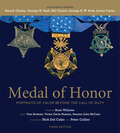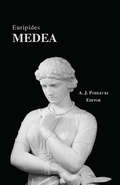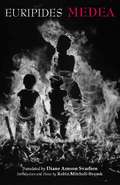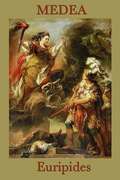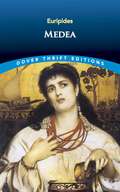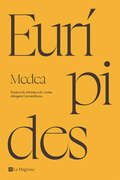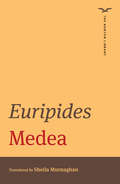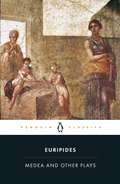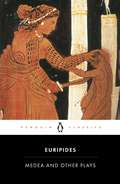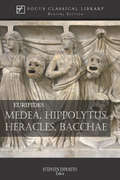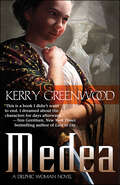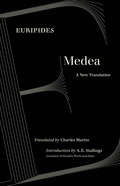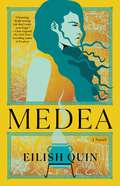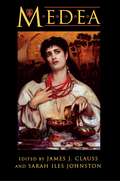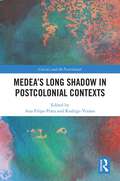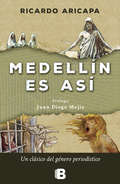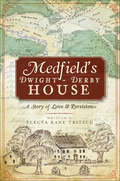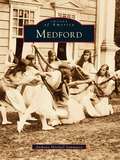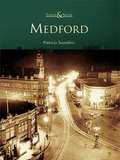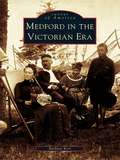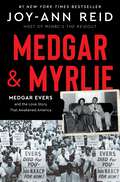- Table View
- List View
Medal of Honor: Third Edition
by Peter Collier Nick Del CalzoOn October 25, 2010, Staff Sergeant Salvatore Giunta became the first living person since the Vietnam War to receive the United States’ highest military decoration, and both he and Sergeant Leroy Petry (the second inductee) rightly take their place in the pages of this third edition of Medal of Honor: Portraits of Valor Beyond the Call of Duty. The book includes 144 contemporary portraits of recipients by award-winning photographer Nick Del Calzo and profiles by National Book Award nominee Peter Collier. First published on Veterans Day 2003, this New York Times bestseller has now been updated and augmented to include new essays plus:• Letters from all living presidents • A foreword by Brian Williams • Profiles of Sergeant Giunta and Sergeant Petry There are also essays by Tom Brokaw, Senator John McCain, and Victor Davis Hanson, and a multimedia DVD with historic footage and recipients’ first-person reflections. The Medal of Honor recipients in the book fought in conflicts from World War II to Afghanistan, serving in every branch of the armed services.
Medea
by Euripides Anthony PodleckiThis is an English translation of Euripides' tragedy Medea based upon the myth of Jason and Medea and her revenge against her husband Jason. Focus Classical Library provides close translations with notes and essays to provide access to understanding Greek culture.
Medea
by Euripides Diane Arnson Svarlien Robin Mitchell-BoyaskThis is the Medea we have been waiting for. It offers clarity without banality, eloquence without pretension, meter without doggerel, accuracy without clumsiness. No English Medea can ever be Euripides', but this is as close as anyone has come so far, and a good deal closer than I thought anyone would ever come. Arnson Svarlien has shown herself exceedingly skillful in making Euripides sound Euripidean.--David M. Schaps, Bryn Mawr Classical Review
Medea
by Euripides Diane Arnson Svarlien Robin Mitchell-BoyaskThis is the Medea we have been waiting for. It offers clarity without banality, eloquence without pretension, meter without doggerel, accuracy without clumsiness. No English Medea can ever be Euripides', but this is as close as anyone has come so far, and a good deal closer than I thought anyone would ever come. Arnson Svarlien has shown herself exceedingly skillful in making Euripides sound Euripidean.--David M. Schaps, Bryn Mawr Classical Review
Medea
by EuripidesMedea is an ancient Greek tragedy written by Euripides, based upon the myth of Jason and Medea and first produced in 431 BC. The plot centers on the barbarian protagonist as she finds her position in the Greek world threatened, and the revenge she takes against her husband Jason who has betrayed her for another woman.
Medea
by EuripidesOne of the most powerful and enduring of Greek tragedies, Medea centers on the myth of Jason, leader of the Argonauts, who has won the dragon-guarded treasure of the Golden Fleece with the help of the sorceress Medea. Having married Medea and fathered her two children, Jason abandons her for a more favorable match, never suspecting the terrible revenge she will take. Euripides' masterly portrayal of the motives fiercely driving Medea's pursuit of vengeance for her husband's insult and betrayal has held theater audiences spellbound for more than twenty centuries. Rex Warner's authoritative translation brings this great classic of world literature vividly to life.
Medea
by EurípidesAmb Medea Eurípides dona el tret de sortida d'un dels caràcters femenins que més han seduït literats, cineastes i creadors plàstics del segle XX. Medea és un dels personatges femenins més polièdrics de la tragèdia de tots els temps: dona i fetillera, esposa i amant, filla, germana i mare, símbol de la dona humiliada i venjadora fins a l'extrem del seu propi dolor. Abandonada pel seu espòs Jàson, que vol casar-se amb la filla del rei de Corint, se sent enganyada i menystinguda i actua en conseqüència: primer assassina la seva rival i després mata els fills que ha tingut amb Jàson. Eurípides va néixer a Salamina cap al 480 aC i amb Èsquil i Sòfocles és un dels tres grans poetes tràgics. Va escriure al voltant de noranta obres, entre les quals Alcestis, Les suplicants i Electra i, tot i no tenir gaire èxit en la vida, va obtenir quatre premis en els concursos actuals atenencs. Després de la seva mort cap al406 aC a la cort del rei Arquelau de Macedònia, on s'havia traslladat, la seva fama va escampar-se per tot el món grec. Les seves obres traspuen un gran escepticisme envers les creences religioses i un apropament a la forma humana de tractar i de resoldre els problemes.
Medea (Gods and Heroes of the Ancient World)
by Emma GriffithsGiving access to the latest critical thinking on the subject, Medea is a comprehensive guide to sources that paints a vivid portrait of the Greek sorceress Medea, famed in myth for the murder of her children after she is banished from her own home and replaced by a new wife. Emma Griffiths brings into focus previously unexplored themes of the Medea myth, and provides an incisive introduction to the story and its history. Studying Medea’s ‘everywoman’ status – one that has caused many intricacies of her tale to be overlooked – Griffiths places the story in ancient and modern context and reveals fascinating insights into ancient Greece and its ideology, the importance of life, the role of women and the position of the outsider. In clear, user-friendly terms, the book situates the myth within analytical frameworks such as psychoanalysis, and Griffiths highlights Medea’s position in current classical study as well as her lasting appeal.
Medea (The Norton Library #0)
by EuripidesAbout Sheila Murnaghan’s translation “A terrific new translation—Murnaghan’s Medea is both terrifying and sympathetic, an emotionally complex portrayal that leaves the reader no simple answers.” —KIRK ORMAND, author of Controlling Desires: Sexuality in Ancient Greece and Rome
Medea and Other Plays
by EuripidesAlcestis/Medea/The Children of Heracles/Hippolytus'One of the best prose translations of Euripides I have seen' Robert FaglesThis selection of plays shows Euripides transforming the titanic figures of Greek myths into recognizable, fallible human beings. Medea, in which a spurned woman takes revenge upon her lover by killing her children, is one of the most shocking of all the Greek tragedies. Medea is a towering figure who demonstrates Euripides' unusual willingness to give voice to a woman's case. Alcestis is based on a magical myth in which Death is overcome, and The Children of Heracles examines conflict between might and right, while Hippolytus deals with self-destructive integrity. Translated by JOHN DAVIE
Medea and Other Plays
by EuripidesMedea/Hecabe/Electra/HeraclesFour devastating Greek tragedies showing the powerful brought down by betrayal, jealousy, guilt and hatredThe first playwright to depict suffering without reference to the gods, Euripides made his characters speak in human terms and face the consequences of their actions. In Medea, a woman rejected by her lover takes hideous revenge by murdering the children they both love, and Hecabe depicts the former queen of Troy, driven mad by the prospect of her daughter's sacrifice to Achilles. Electra portrays a young woman planning to avenge the brutal death of her father at the hands of her mother, while in Heracles the hero seeks vengeance against the evil king who has caused bloodshed in his family.Translated with an Introduction by PHILIP VELLACOTT
Medea, Hippolytus, Heracles, Bacchae: Four Plays
by Euripides Stephen Esposito Michael R. Halleran Anthony PodleckiThis anthology includes four outstanding translations of Euripides’ plays: Medea, Bacchae, Hippolytus, and Heracles. These translations remain close to the original, with extensive introductions, interpretive essays, and footnotes. This series is designed to provide students and general readers with access to the nature of Greek drama, Greek mythology, and the context of Greek culture, as well as highly readable and understandable translations of four of Euripides most important plays. Focus also publishes each play as an individual volume.
Medea: A Delphic Woman Novel (Delphic Women Series #1)
by Kerry GreenwoodWho can you turn to when society spits you out?Former LA prosecutor Cal Claxton has escaped to the Oregon wine country after his wife's suicide, determined to live a less-harried life. He's gotten a dog for company and takes pleasure in simple things like hiking, fishing, and crafting gourmet meals from the area's bounty, which he enjoys with local wines. He has no career ambitions, other than to sustain a small practice that will allow him to pay his bills. Then he's approached by a homeless street artist from Portland who wants him to take on the cold case investigation of his mother's murder. The young man believes his mother's boyfriend killed her eight years earlier, but the police were never able to solve the case. Cal turns him away. But his conscience won't let him rest…Cal takes on the case against his better judgment. Soon, however, the street artist is charged with the boyfriend's murder, and Cal has to battle bias from the press, police, and public, along with his own doubts about his client in order to determine who has committed both crimes—and why.
Medea: A New Translation
by EuripidesThe Medea of Euripides is one of the greatest of all Greek tragedies and arguably the one with the most significance today. A barbarian woman brought to Corinth and there abandoned by her Greek husband, Medea seeks vengeance on Jason and is willing to strike out against his new wife and family—even slaughtering the sons she has born him. At its center is Medea herself, a character who refuses definition: Is she a hero, a witch, a psychopath, a goddess? All that can be said for certain is that she is a woman who has loved, has suffered, and will stop at nothing for vengeance. In this stunning translation, poet Charles Martin captures the rhythms of Euripides’ original text through contemporary rhyme and meter that speak directly to modern readers. An introduction by classicist and poet A.E. Stallings examines the complex and multifaceted Medea in patriarchal ancient Greece. Perfect in and out of the classroom as well as for theatrical performance, this faithful translation succeeds like no other.
Medea: A Novel
by Eilish QuinDiscover the full story of the sorceress Medea, one of the most reviled and maligned women of Greek antiquity, in this propulsive and evocative debut in the tradition of Circe, Elektra, and Stone Blind.Among the women of Greek mythology, the witch Medea may be the most despised. Known for the brutal act of killing her own children to exact vengeance on her deceitful husband, the Argonauts leader Jason, Medea has carved out a singularly infamous niche in our histories. But what if that isn&’t the full story? The daughter of a sea nymph and the granddaughter of a Titan, Medea is a paradox. She is at once rendered compelling by virtue of the divinity that flows through her bloodline and made powerless by the fact of her being a woman. As a child, she intuitively submerges herself in witchcraft and sorcery, but soon finds it may not be a match for the prophecies that hang over her entire family like a shroud. As Medea comes into her own as a woman and a witch, she also faces the arrival of the hero Jason, preordained by the gods to be not only her husband, but also her lifeline to escape her isolated existence. Medea travels the treacherous seas with the Argonauts, battles demons she had never conceived of, and falls in love with the man who may ultimately be her downfall. In this propulsive, beautifully written debut, readers will finally hear Medea&’s side of the story through a fresh and feminist lens.
Medea: Essays on Medea in Myth, Literature, Philosophy, and Art
by Sarah Iles Johnston James J. ClaussFrom the dawn of European literature, the figure of Medea--best known as the helpmate of Jason and murderer of her own children--has inspired artists in all fields throughout all centuries. Euripides, Seneca, Corneille, Delacroix, Anouilh, Pasolini, Maria Callas, Martha Graham, Samuel Barber, and Diana Rigg are among the many who have given Medea life on stage, film, and canvas, through music and dance, from ancient Greek drama to Broadway. In seeking to understand the powerful hold Medea has had on our imaginations for nearly three millennia, a group of renowned scholars here examines the major representations of Medea in myth, art, and ancient and contemporary literature, as well as the philosophical, psychological, and cultural questions these portrayals raise. The result is a comprehensive and nuanced look at one of the most captivating mythic figures of all time. Unlike most mythic figures, whose attributes remain constant throughout mythology, Medea is continually changing in the wide variety of stories that circulated during antiquity. She appears as enchantress, helper-maiden, infanticide, fratricide, kidnapper, founder of cities, and foreigner. Not only does Medea's checkered career illuminate the opposing concepts of self and other, it also suggests the disturbing possibility of otherness within self. In addition to the editors, the contributors include Fritz Graf, Nita Krevans, Jan Bremmer, Dolores M. O'Higgins, Deborah Boedeker, Carole E. Newlands, John M. Dillon, Martha C. Nussbaum, Christiane Sourvinou-Inwood, and Marianne McDonald.
Medea’s Long Shadow in Postcolonial Contexts (Classics and the Postcolonial)
by Ana Filipa PrataThis interdisciplinary volume explores the ancient Greek myth of Medea and its global analogues found in other mythic and folk tales of deadly, exiled women, such as those of La Malinche and La Llorona, examining the connections between these figures and their depictions from antiquity to modernity.The book considers the figure of the foreign woman, her exile, fratricide, and infanticide, in its ancient Greek form and in global, postcolonial receptions in a range of media, including drama, film, novels, and the visual arts. The chapters illuminate the contradictions of considering the classical Medea as a central reference point for analysis of other female figures from peripheral territories, while simultaneously acknowledging the insights that such comparisons can yield. Emphasizing the ways in which Medea’s seditious nature enables the establishment of an extensive and heterogeneous intertextual network with other mythic characters who represent a similarly disruptive role in their specific local historical and cultural contexts, the book argues for a comparative analysis that is equally attentive to myths and folk tales from all regions. These essays – by scholars of classics, comparative and world literatures, and postcolonial studies – represent a plurality of perspectives from different academic contexts in Africa, Latin America, North America, and Europe and examine how different cultures have depicted women, foreigners, crime, and abjection. The foundations of Greek myth and subsequently of the classical tradition itself are interrogated from a postcolonial perspective. In tracing the portrayals of Medea and other mythic women through the overlapping features of different female characters and plots, and intertwining local cultural and literary materials with broader debates, this volume challenges Eurocentric narratives of power and cultural domination, and works to decentralize the discussion of Medea from the exclusive domain of classical studies.Medea’s Long Shadow in Postcolonial Contexts will be of interest to students and scholars working on Greek tragedy and its reception, as well as to those studying postcolonial and global approaches to literature, culture, and gender studies.
Medellín es así
by Ricardo Aricapa ArdilaEl verdadero rostro de Medellín de la pluma de Ricardo Aricapa. En este libro Ricardo Aricapa ha desarrollado un periodismo donde el énfasis está en las imágenes. Imágenes visuales y verbales que nos conmueven y expresan los sentimientos más hondos de una ciudad paradójica. Una urbe dinámica y hostil, en la cual la beatitud y la criminalidad, por exclusión, copan de historias una realidad avasallante, rítmica. Aunque es una radiografía de la marginalidad, incluso su lenguaje, también es el grito de esperanza de una raza pujante y desigual socialmente.
Medfield's Dwight-Derby House: A Story of Love & Persistence (Landmarks)
by Electa Kane TritschConstructed in 1651, the Dwight-Derby House stands as the centerpiece of the Medfield town common and at the heart of the town�s history. Contained within the walls of this 350-year-old time capsule are the stories of two prominent families: the Dwights and the Derbys�united in their deep connection to the home. To this day, the house remains a testament to the dedication and fortitude of the community, which banded together and succeeded in preserving this historic landmark. Join Electa Tritsch on her journey of sifting through records, artifacts and dusty cardboard boxes as she enlivens the story of the Dwight-Derby House�a home that has brought outthe best of this thriving community.
Medford
by Kevin KeatingIradell Phipps and Conrad Broback saw a golden opportunity in 1884. After convincing the railroad to build its depot on their prairie land near Bear Creek, they began building what became the second-fastest growing city in America, with over 100 new buildings in its first year. Few Medfordites today know that the city once had four separate railroads and was renowned throughout Europe. Intrepid flyers Eugene Ely, Pat Patterson, Seely Hall, and Charles Lindbergh made Medford a regional air hub during the early days of flight. In 1910, Medford had more automobiles per capita than any town in the world, and in 1923, it straddled the world's longest paved road. Told through photographs, facts, and anecdotes, the story of the hometown of film and radio stars Pinto Colvig and Ginger Rogers, as well as sports greats like Dick Fosbury, Bill Bowerman, and Kyle Singler, is a captivating read.
Medford (Images of America)
by Anthony Mitchell SammarcoReferred to in its beginning as a "peculiar town," Medford was originally a town but a plantation owned by Governor Matthew Craddock. Known as Meadford at the time of its settlement in 1630, the area was a flourishing village located along the Mystic River that boasted numerous farms, fisheries, and shipbuilding. A small town for the first two centuries after it was settled, Medford was conveniently located only a few miles from Boston. Its prime location soon attracted thousands of residents, and by the turn of the twentieth century, Medford had become a cultural mecca with over 18,000 residents. The town's strong sense of community and respect for diversity has continued through the years, transforming a small fishing and farming village into one of the finest residential communities in metropolitan Boston. In Medford, author Anthony Mitchell Sammarco invites his readers to join him on a journey back in time to an earlier Medford, when local transportation meant a ride on a horse-drawn streetcar or a train ride on the Boston & Lowell line. Within these pages, learn little-known facts about the founding of renowned institutions such as Tufts University, view candid snapshots of early Medford residents at work and at play, and discover rare photographs of the area's more unusual influences, from the exotic foods and customs introduced by European settlers to the impact of the town's gypsy moth dilemma.
Medford (Then and Now)
by Patricia SaundersMedford, originally referred to as Meadford, was settled as a plantation in 1630 by Gov. Matthew Craddock. A historic city located on the Mystic River in Middlesex County, Medford gained fame from its clipper ships, crackers, and rum. The song "Jingle Bells" was composed here by James Pierpoint in the early 1850s. Many prominent citizens have lived in Medford, including Amelia Earhart, who moved to the city in 1924. Medford, part of the Then & Now series, connects this city's past with its present by comparing historic and modern photographs of sites such as the Royall House, Jonathan Wade House, and Peter Tufts-Craddock House.
Medford in the Victorian Era (Images of America)
by Barbara KerrWhen the Boston and Lowell Railroad came through in 1835, Medford was a quiet town with fewer than two thousand residents. By the twentieth century, it had become a thriving city of eighteen thousand. In Victorian Medford, everything was new, from the Medford Opera House, the town hall, and the Mystic Lakes to the camera, the bicycle, and the gypsy moth. The shipbuilding, rum, and brickmaking industries gave way to new businesses, and traditional houses came to share neighborhoods with Queen Anne and Shingle-style architecture. In the mid-nineteenth century, there was great social change, as abolitionists Lydia Maria Child and George Luther Stearns spoke out against slavery and men went to the Civil War. James W. Tufts invented the soda fountain, Fannie Farmer wrote her first cookbook, and James Pierpont wrote "Jingle Bells."
Medford: A Brief History
by Dee MorrisSince its early days in the possession of a man who never set foot on the land itself, Medford has been a place of possibility. Many Medford residents have made their mark on American culture, including James W. Tufts, the inventor of the soda fountain, and Fannie Farmer, author of the first modern cookbook. Medford has been the site of revolutionary changes, as entrepreneur Thatcher Magoun built the wildly successful clipper ship industry, and in the case of Belinda Royall, a slave who remarkably won her legal emancipation in 1773. Author Dee Morris renders a richly detailed history, from the Medford Square rum distilleries that sent a molasses smell wafting through town for centuries to the celebration for Amelia Earhart, who lived in West Medford briefly, before her first successful transatlantic flight. Medford: A Brief History reveals hidden stories behind a small town with a big legacy.
Medgar and Myrlie: Medgar Evers and the Love Story That Awakened America
by Joy-Ann Reid#1 New York Times Bestseller“Medgar Evers deserves a place alongside Malcolm X and Dr. King in our historical memory. Evers, with Myrlie as his partner in activism and in life, was doing civil rights work in the single most hostile and dangerous environment in America.”—from Medgar and MyrlieBy MSNBC's Joy-Ann Reid, a triumphant work of biography that repositions slain Civil Rights pioneer Medgar Evers at the heart of America's struggle for freedom, and celebrates Myrlie Evers's extraordinary activism after her husband's assassination in the driveway of their Mississippi home."I love this book. The empathic, brilliant, and wise Joy Reid has brought us the poignant, fascinating inside story of Medgar and Myrlie Evers, transformational leaders who confronted pure evil and risked their lives to ensure that all American children might grow up in a United States that was more just. As Reid shows us, that painful task is now more urgent than ever.” — Michael BeschlossMyrlie Louise Beasley met Medgar Evers on her first day of college. They fell in love at first sight, married just one year later, and Myrlie left school to focus on their growing family.Medgar became the field secretary for the Mississippi branch of the NAACP, charged with beating back the most intractable and violent resistance to black voting rights in the country. Myrlie served as Medgar’s secretary and confidant, working hand in hand with him as they struggled against public accommodations and school segregation, lynching, violence, and sheer despair within their state’s “black belt.” They fought to desegregate the intractable University of Mississippi, organized picket lines and boycotts, despite repeated terroristic threats, including the 1962 firebombing of their home, where they lived with their three young children.On June 12, 1963, Medgar Evers became the highest profile victim of Klan-related assassination of a black civil rights leader at that time; gunned down in the couple’s driveway in Jackson. In the wake of his tragic death, Myrlie carried on their civil rights legacy; writing a book about Medgar’s fight, trying to win a congressional seat, and becoming a leader of the NAACP in her own right.In this groundbreaking and thrilling account of two heroes of the civil rights movement, Joy-Ann Reid uses Medgar and Myrlie’s relationship as a lens through which to explore the on-the-ground work that went into winning basic rights for Black Americans, and the repercussions that still resonate today.
